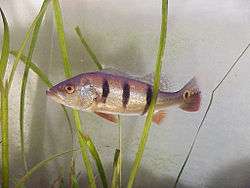Cichla
| Cichla | |
|---|---|
 | |
| Juvenile C. orinocensis | |
| Scientific classification | |
| Kingdom: | Animalia |
| Phylum: | Chordata |
| Class: | Actinopterygii |
| Order: | Perciformes |
| Family: | Cichlidae |
| Subfamily: | Cichlinae |
| Genus: | Cichla Bloch & J. G. Schneider, 1801 |
| Type species | |
| Cichla ocellaris Bloch & Schneider, 1801 | |
Cichla is a genus of cichlids native to freshwater habitats in tropical South America, but a few species have been introduced to regions outside their native range. The genus includes several species valued as game fish, collectively known as peacock bass, and is also of interest to cichlid-keeping aquarists. Cichla species are amongst the largest cichlids, with one species, C. temensis, growing to about 1 m (3 ft 3 in).[1]
Species
Currently, 15 recognized species are in this genus:[1][2]
- Cichla intermedia Machado-Allison, 1971
- Cichla jariina S. O. Kullander & E. J. G. Ferreira, 2006
- Cichla kelberi S. O. Kullander & E. J. G. Ferreira, 2006
- Cichla melaniae S. O. Kullander & E. J. G. Ferreira, 2006
- Cichla mirianae S. O. Kullander & E. J. G. Ferreira, 2006
- Cichla monoculus Agassiz, 1831
- Cichla nigromaculata Jardine & R. H. Schomburgk, 1843
- Cichla ocellaris Bloch & J. G. Schneider, 1801 (peacock cichlid)
- Cichla orinocensis Humboldt, 1821
- Cichla pinima S. O. Kullander & E. J. G. Ferreira, 2006
- Cichla piquiti S. O. Kullander & E. J. G. Ferreira, 2006
- Cichla pleiozona S. O. Kullander & E. J. G. Ferreira, 2006
- Cichla temensis Humboldt, 1821 (speckled pavon)
- Cichla thyrorus S. O. Kullander & E. J. G. Ferreira, 2006
- Cichla vazzoleri S. O. Kullander & E. J. G. Ferreira, 2006
Extensive molecular data have cast doubt on these designations, however.[3] Aside from limited hybridization among many species, in both natural and human-altered environments, several species do not show sufficient differentiation to imply reproductive isolation and/or a history of independent evolution. Among the species implicated as probable "good" species were C. intermedia, C. orinocensis, C. temensis, C. melaniae, C. mirianae, and C. piquiti. The other species were suggested to be part of two widespread metaspecies or species complexes, called C. pinima sensu lato (including C. jariina, C. thyrorus, and C. vazzoleri) and C. ocellaris sensu lato (including C. monoculus, C. nigromaculata, C. pleiozona, and C. kelberi).
References
- 1 2 Froese, Rainer, and Daniel Pauly, eds. (2013). Species of Cichla in FishBase. February 2013 version.
- ↑ Kullander, Sven; Efrem Ferreira (2006). "A review of the South American cichlid genus Cichla, with descriptions of nine new species (Teleostei: Cichlidae)" (PDF). Ichthyological Explorations of Freshwaters. 17 (4).
- ↑ Willis, Stuart; Izeni Farias; Guillermo Orti (2012). "Simultaneous delimitation of species and quantification of interspecific hybridization in Amazonian peacock cichlids (genus Cichla) using multi-locus data". BMC Evolutionary Biology. 12 (96). doi:10.1186/1471-2148-12-96. PMC 3563476
 . PMID 22727018.
. PMID 22727018.